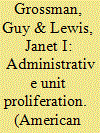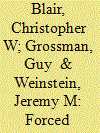|
|
|
Sort Order |
|
|
|
Items / Page
|
|
|
|
|
|
|
| Srl | Item |
| 1 |
ID:
131509


|
|
|
|
|
| Publication |
2014.
|
| Summary/Abstract |
Numerous developing countries have substantially increased their number of subnational administrative units in recent years. The literature on this phenomenon is, nonetheless, small and suffers from several theoretical and methodological shortcomings: in particular, a unit of analysis problem that causes past studies to mistakenly de-emphasize the importance of local actors. We posit that administrative unit proliferation occurs where and when there is a confluence of interests between the national executive and local citizens and elites from areas that are politically, economically, and ethnically marginalized. We argue further that although the proliferation of administrative units often accompanies or follows far-reaching decentralization reforms, it likely results in a recentralization of power; the proliferation of new local governments fragments existing units into smaller ones with lower relative intergovernmental bargaining power and administrative capacity. We find support for these arguments using original data from Uganda.
|
|
|
|
|
|
|
|
|
|
|
|
|
|
|
|
| 2 |
ID:
148662


|
|
|
|
|
| Summary/Abstract |
A large literature examining advanced and consolidating democracies suggests that education increases political participation. However, in electoral authoritarian regimes, educated voters may instead deliberately disengage. If education increases critical capacities, political awareness, and support for democracy, educated citizens may believe that participation is futile or legitimizes autocrats. We test this argument in Zimbabwe—a paradigmatic electoral authoritarian regime—by exploiting cross-cohort variation in access to education following a major educational reform. We find that education decreases political participation, substantially reducing the likelihood that better-educated citizens vote, contact politicians, or attend community meetings. Consistent with deliberate disengagement, education’s negative effect on participation dissipated following 2008’s more competitive election, which (temporarily) initiated unprecedented power sharing. Supporting the mechanisms underpinning our hypothesis, educated citizens experience better economic outcomes, are more interested in politics, and are more supportive of democracy, but are also more likely to criticize the government and support opposition parties.
|
|
|
|
|
|
|
|
|
|
|
|
|
|
|
|
| 3 |
ID:
186189


|
|
|
|
|
| Summary/Abstract |
Little theoretical or empirical work examines migration policy in the developing world. We develop and test a theory that distinguishes the drivers of policy reform and factors influencing the direction of reform. We introduce an original data set of de jure asylum and refugee policies covering more than ninety developing countries that are presently excluded from existing indices of migration policy. Examining descriptive trends in the data, we find that unlike in the global North, forced displacement policies in the global South have become more liberal over time. Empirically, we test the determinants of asylum policymaking, bolstering our quantitative results with qualitative evidence from interviews in Uganda. A number of key findings emerge. Intense, proximate civil wars are the primary impetus for asylum policy change in the global South. Liberalizing changes are made by regimes led by political elites whose ethnic kin confront discrimination or violence in neighboring countries. There is no generalizable evidence that developing countries liberalize asylum policy in exchange for economic assistance from Western actors. Distinct frameworks are needed to understand migration policymaking in developing versus developed countries.
|
|
|
|
|
|
|
|
|
|
|
|
|
|
|
|
| 4 |
ID:
133950


|
|
|
|
|
| Publication |
2014.
|
| Summary/Abstract |
How does access to information communication technology (ICT) affect who gets heard and what gets communicated to politicians? On the one hand, ICT can lower communication costs for poorer constituents; on the other, technological channels may be used disproportionately more by the already well connected. To assess the flattening effects of ICTs, we presented a representative sample of constituents in Uganda with an opportunity to send a text message to their representatives at one of three randomly assigned prices. Critically, and contrary to concerns that technological innovations benefit the privileged, we find evidence that ICT can lead to significant flattening: a greater share of marginalized populations use this channel compared to existing political communication channels. Price plays a more complex role. Subsidizing the full cost of messaging increases uptake by over 40%. Surprisingly however, subsidy-induced increases in uptake do not yield further flattening since free channels are not used at higher rates by more marginalized constituents.
|
|
|
|
|
|
|
|
|
|
|
|
|
|
|
|
| 5 |
ID:
159500


|
|
|
|
|
| Summary/Abstract |
Politicians shirk when their performance is obscure to constituents. We theorize that when politician performance information is disseminated early in the electoral term, politicians will subsequently improve their performance in anticipation of changes in citizens’ evaluative criteria and possible challenger entry in the next election. However, politicians may only respond in constituencies where opposition has previously mounted. We test these predictions in partnership with a Ugandan civil society organization in a multiyear field experiment conducted in 20 district governments between the 2011 and 2016 elections. While the organization published yearly job duty performance scorecards for all incumbents, it disseminated the scorecards to constituents for randomly selected politicians. These dissemination efforts induced politicians to improve performance across a range of measures, but only in competitive constituencies. Service delivery was unaffected. We conclude that, conditional on electoral pressure, transparency can improve politicians’ performance between elections but not outcomes outside of their control.
|
|
|
|
|
|
|
|
|
|
|
|
|
|
|
|
| 6 |
ID:
146147


|
|
|
|
|
| Summary/Abstract |
Recent research has highlighted combat's positive effects for political behavior, but it is unclear whether they extend to attitudes toward the conflict itself. We exploit the assignment of health rankings determining combat eligibility in the Israel Defense Forces to examine the effect of combat exposure on support for peaceful conflict resolution. Given the centrality of the Israeli-Palestinian conflict to global affairs, and its apparent intractability, the political consequences of combat become all the more pressing. We find that exposure to combat hardens attitudes toward the rival and reduces support for negotiation and compromise. Importantly, these attitudes translate into voting behavior: combatants are likely to vote for more hawkish parties. These findings call for caution in emphasizing the benign effects of combat and underscore the importance of reintegrating combatants during the transition from conflict to peace.
|
|
|
|
|
|
|
|
|
|
|
|
|
|
|
|
|
|
|
|
|